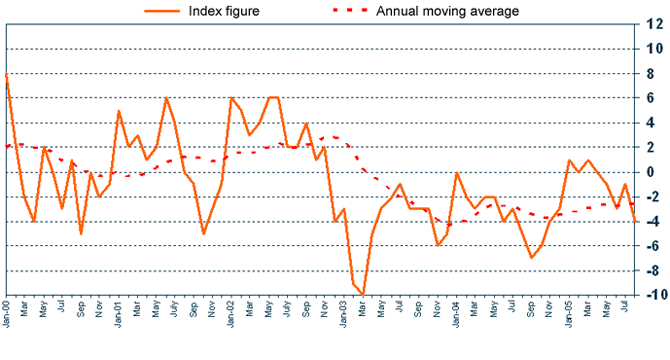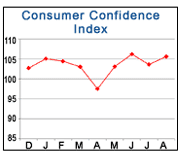With the end of the month comes a raft of worldwide consumer confidence analysis. According to GfK, UK consumers are increasingly pessimistic while the German mood is improving, particularly in the West and for higher income groups. In the US, the Conference Board Index rises while the BIG index is stable.
UK: GfK Martin Hamblin/European Commission Consumer Confidence Survey
The consumer confidence index for the UK falls to -4 in August, from -1 in July, according to GfK Martin Hamblin's survey of 2,000 adults carried out for the European Commission. This decline takes it to the lowest level seen since October 2004, when it stood at -6. The drop is driven mainly by declines in the Major Purchases measure (which fell by four points to +8) and consumers' views of the country's general economic situation. The measure for General Economic Situation over the last twelve months fell six points to -24, and predictions for the next twelve months fell two points to -13.
Other measures were less negative: perceptions of personal finances over the last twelve months remain the same for the sixth month running (-1). Perceptions of the development of personal finances over the next twelve months increase by one point to +12. Meanwhile, the perception of whether now is a good time to save falls by five points to +21, possibly linked to the fall in the Bank of England base rate. However, the current level is only one point lower than the same period last year.
Grant Montague, Divisional Director at GfK Martin Hamblin says the fall in the overall index may be a delayed reaction to the terrorist events of July.
GfK UK Consumer Confidence Index:

Germany: GfK Consumer Climate MAXX/ European Commission Survey
The GfK consumer climate MAXX survey, also based on 2,000 interviews, shows consumer mood indicators improving in Germany, especially in the west, after several months of low morale. The company's new analysis of social groups shows that older people and those with a lower income remain pessimistic about the economy.
The consumer climate forecast for September is 3.4 points, up from a revised 3.2 points for August. The Propensity to Buy indicator has risen for the second successive month, and the Economic Outlook indicator climbs 4.1 points to - 11.6 points, the highest value since January 2005. In Western Germany it increases by 6.5 to -6.8 points, while it drops by 4.5 points to -30.2 in the East.
For the first time this month, GfK has analysed the findings according to social group. The analysis shows that employed people, housewives and househusbands, students and trainees are all more positive than last month. However, for older retired people, the indicator falls by 8.5 points to -28.5, around 17 points below the national average. In addition, those with low and medium incomes are largely sceptical about economic prospects, despite an improvement since last month.
The Income Expectations indicator is up 4.2 points overall - increasing by almost 5.1 points in Eastern Germany compared with a 2.6 point rise in the West. The economic expectations measure for people with a low income has fallen by 6.2 points to -18.6.
The upward trend in the Propensity to Buy indicator continues from the previous month, climbing by 8.6 points from -13.1 to -4.5, the highest level since December 2001. In the West, the indicator rises by 9.5 points, compared with a 4.2-point rise in the East, where it remains very low at -33.4 points. The Propensity to Buy indicator increases most among those in the medium income bracket. With an increase of 13.7 points, the indicator for people on a low income has also risen but, at - 17.4, it is still considerably lower than the population average and at a similar level to the indicator for older, retired people. The propensity to make major purchases dropped in two of the five social groups - students and trainees and older retired people.
USA: The Conference Board's Consumer Confidence Index
This Index, based on the Consumer Confidence Survey of 5,000 US households conducted by TNS NFO, rebounds in August, showing Americans in a confident mood. It now stands at 105.6 (1985=100), up from 103.6 in July. The Present Situation Index increases to 123.6 from 119.3 - its highest level in nearly four years - and the Expectations Index edges up to 93.7 from 93.2 last month.
Consumers' overall assessment of conditions is more favourable than last month. Those claiming business conditions are 'good' increases to 29.8% from 28.7%, while those saying they are 'bad' slips to 15.1% from 16.7%.
The employment picture is also more upbeat. The proportion of consumers saying jobs are 'hard to get' falls to 23.2% from 23.8%, while those claiming jobs are 'plentiful' rises to 23.5% from 22.9%. For the first time since October 2001, the percentage claiming jobs are plentiful outnumbers the proportion claiming jobs are hard to get. Those expecting more jobs to become available in the coming months increases this month to 16.6% from 15.6%. But the percentage expecting fewer jobs also edges up - to 17.2% from 16.7%.
Consumers' short-term outlook has improved marginally since July. Those anticipating business conditions to improve in the next six months increases to 18.7% from 17.9%. However, those expecting conditions to worsen also rises - to 9.7% from 9.5%. The proportion of consumers anticipating their incomes to increase in the months ahead increases to 19.8% from 18.6%.
Conference Board Consumer Confidence Index:

BIG Research Consumer Intentions & Actions Survey
Results from the BIG Research survey, based on the responses of 8,000 US consumers, are more cautious. Its consumer confidence measure remains steady in August at 44.0%. It is down three points from a year ago (47.0%), but up more than five points since 2003 (38.6%). 'Practicality' among consumers is also stable, as 37.3% report they've become more practical and realistic in their purchases over the last six months, down about three points from last year (40.6%).
With the unemployment rate holding steady at 5%, consumers display mixed emotions about the employment outlook. Those who expect more layoffs over the next six months falls to 30.6% (vs 31.7% in July), though this seems relatively high when compared with the 17.3% in the Conference Board survey who believe fewer jobs will be available over the next few months. BIG says that personal fears about becoming laid off are up slightly 4.4% (from 4.0% last month), though down almost two points from last year (6.3%).
The company also says that rising gas prices are affecting consumers' financial decisions. Although 'pay down debt' and 'decrease overall spending' are in consumers' top financial plans, fewer people plan to do so over the next three months than at this time last year. There is also a decrease in plans to increase savings and to pay with cash more often.
GfK is online at www.gfk.com , the Conference Board web site is at www.conference-board.org , and BIG Research is at www.bigresearch.com
All articles 2006-23 written and edited by Mel Crowther and/or Nick Thomas, 2024- by Nick Thomas, unless otherwise stated.
Register (free) for Daily Research News
REGISTER FOR NEWS EMAILS
To receive (free) news headlines by email, please register online